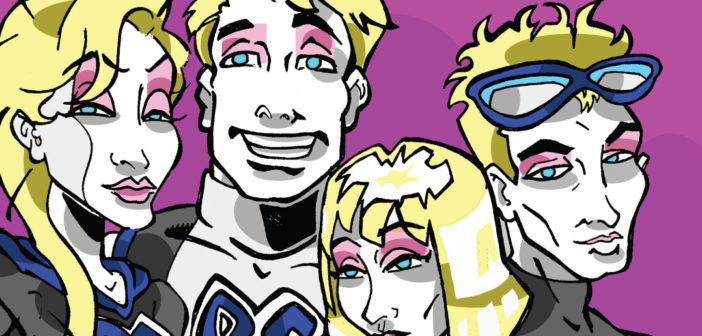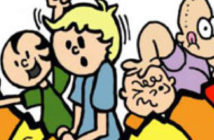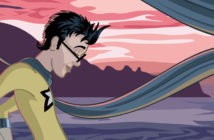In order to focus my mind on the task of writing about the first issue of Michael Troy’s Blonde Squad, I listened to “Dancing Queen” by ABBA a few times. Trust me, it helped.
You see, creator Troy is telling us a tale about superficiality: the superficiality of men and women, the superficiality of gay people and straight people, the superficiality of blondes and brunettes—the superficiality of everyone and everything. He’s got a point. I personally have quite a few superficial quirks, even though I don’t really have much to be superficial about.
The Blonde Squad is a superhero foursome (kinky wording in this context, I know) comprised of four “fabulous” blondes with their own special powers. The group is led by Matthew Turning, a Hollywood reporter by day, but he’s actually Blonder Man, a superhuman who crash-landed from outer space when he was only an infant. A spin on Superman? Rest assured that he is.
Next on the roster is London Holiday. She strikes me as some kind of Paris Hilton parody in Troy’s fictionalized Los Angeles. Her power: she can drain the energy of those around her and release it in blasts of energy. She has a twin cousin, Mitchie Holiday, who is gay but insists on hiding in the closet, though everyone around him knows his secret. And what can he do? He has super speed, a standard but important supernatural ability. For this, his name is Speed Bump. And last we have Inga Von Svedenhaus, a Nordic telepath cleverly named Psight.
Thought these four form the Blonde Squad superhero team, they don’t perform too many acts of heroism. In fact, judging by the first issue, they don’t perform any courageous feats. They’re all about selling their brand instead of bettering the world with their abilities. I’m vaguely reminded of the Fantastic Four, who were all out of the superhero closet and had their own PR initiatives to manage their collective image.
But the Squad is forced to react after a failed appearance on Jay Leno’s late-night show. The reason—a mysterious brunette named the Dark Swan. Her mission is clear: she wants to bring an end to all blondes in the world.
Blonde Squad is garishly illustrated, even more garishly colored, and the writing is very campy. But Troy is trying to get across a point. And while I can’t be certain that his message resonates with me personally, this is only the first issue. I’m curious how he will carry out this light-hearted miniseries. But above all else, I respect this book as the personal expression that it is.
This comic book review originally appeared on Broken Frontier.




